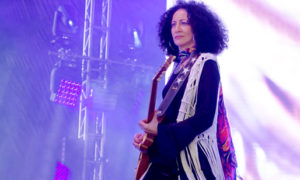Eljuri Celebrates the Differences

A musician and activist, singer-guitarist Eljuri is a lead organizer for the Women’s March on NYC. She has also helped to raise funds for immigrants through a benefit concert for the NYCLU, has built clean water centers with and serves on the Boards of ViaTalenta and Aquality International (formerly Water Ecuador), and developed and offers her bilingual Eljuri on Guitars/Eljuri en las Guitarras workshops to schools and community centers.
For her latest album, Resiste, she revisited her previous albums and plucked the reggae songs from them and paired them with some new tracks she cut with the phenomenal rhythm section known as Sly & Robbie. It’s a terrific collection of tunes that veers from the pulsating title track that opens the album to the inspiring “BangBang,” a tune won the 2019 Songs for Social Change Songwriting Competition by the Renaissance Artists and Writers Association, and “Empuja,” an intense tune with snarling guitars and hushed vocals.
Eljuri spoke to us via phone from her New York home.
You were born in Ecuador but grew up in New York, how does that inform your music?
I was born in Ecuador and when I came to the U.S. as a baby girl, my family was really a Latino-centric household. I was listening to Afro-Cuban songs and South American rhythms and all this great music at home. My father is from Spain, so I listened to flamencos too. It was great stuff. My mother played the piano. And this was New York City, so my brothers and sisters were into punk and rock and funk. Growing up as a musician, I was exposed to great, great music. I was learning reggae from Jamaican musicians in New York. My love was rock and guitar, and reggae was always something I liked early on. My sound is a fusion of all that. Even when I’m doing a reggae song, you can hear Latin and funk in there. The punk sensibility means that my message is about rising up. Being an immigrant, the times we’re in now are so urgent. That’s the background to my melting pot of a sound.
What made you want to pick up the guitar?
I was playing piano mostly and loved it. Guitar was just a cool instrument that great players and songwriters were playing — the Neil Youngs and Bonnie Raitts of the world. I was a kid [and I] looked up to them. I played guitar from the time I was about 13 and then started my own band and played CBGBs when I was 17.
What was your time with the Trouble Dolls like?
We had such diverse backgrounds. Some people had reggae and some had pop. We had a Latino girl and a straight-up rock girl. I was all of those things. It was a fun time. We were at each other’s throats, but it was fun.
How difficult was it to transition to becoming a solo artist with En Paz in 2008?
It wasn’t difficult. It was very organic. I loved songwriting and that’s the most important to me. I say I like to play guitar, but I love to write. I needed to give the songs what they were calling for and that meant being a solo artist.
What made you want to put out an album of your reggae tunes?
Some are old and some are new. I was starting to write for my new record. “Resiste” came out because I was so frustrated about what was going on, and it was such a reggae song. I have a home studio where I work out all the songs, and I thought it would be great to put out a collection of all my reggae songs. I thought it would be cool because they sit on other albums around other songs but I thought it would be nice to put the reggae kids together. I wanted to do a remix too, so I did that for “Una Ola,” which is my first reggae song. Sly & Robbie pursued me because of that song.
What about reggae appeals to you?
[I like to] feel the bass in your body. It’s so fat and full, and it’s deep-rooted. I got even deeper into reggae because of them.
What’s the story behind the opening track, “Resiste”?
It was basically that the people inside are calling out the people in power as amoral. That inspired the song. That was a certain element that made me think, “If you go to trial, it’s your fault.” That’s the people on the inside’s perspective. But then, the chorus is about the people who are being affected.
Did a specific incident inspire “BangBang?”
It wasn’t specific as much as it’s just about how relentless [police] violence is. I made it bilingual because it’s a global problem.
Why is it important for you to engage in activism?
My songs reflect my point of view as well as a reflection of what I hear. I’m in immigrant and I feel like I’m in a position to speak out for other people. I’ve been inspired by other artists who are that way. That’s always been the case. One of the first songs on my first solo album was about how we shouldn’t fight over borders. I feel somewhat fortunate to be in a city where different cultures exist, and I have a diverse group of friends. Tolerance is important and it’s really at risk these days. We should celebrate our differences. My mother is Lebanese, my father is from Spain and I was born in Ecuador. I think it’s important to show people that a person of a diverse background is not scary.
Photo provided by Cecilia Villar Eljuri











